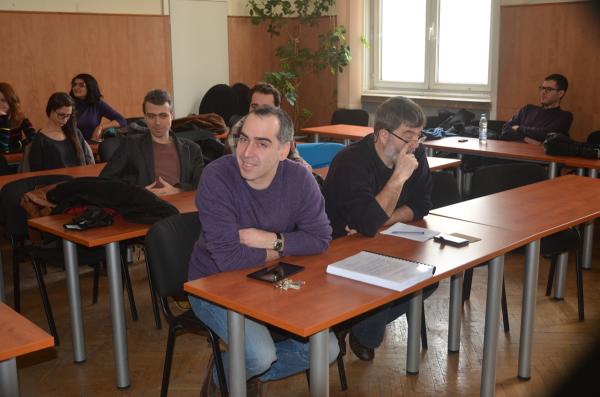The idea behind "History of Philosophy and Contemporary Philosophy" program is to prepare professional and competent specialists or researchers with a broad profile in the history of philosophy and its current state, to prepare teachers for social sciences and humanities in secondary and higher education, to help translators and editors of philosophical and humanitarian literature.
Our general objectives are: to cultivate knowledge, skills, habits and attitudes relevant to today’s rapidly evolving national, European and global socio-historical processes and to understand philosophical theories that attempt to comprehend these processes. The program aims to prepare graduate with an in-depth look at the history of philosophy and contemporary philosophy, professionals with extensive erudition, methodological skills, analytical ability and critical thinking. Students will gain widespread basic knowledge and additional specialized knowledge in the field of philosophy, its complexity, communicative potential, different traditions and values. By developing the ability to self-improve they enrich their knowledge and skills. This type of training is aimed at the formation of knowledge on the evolution of the philosophical and social thought, various intellectual systems, forms of critical and creative thinking, and forms of cultural self-reflection.
Learning (knowledge and skills necessary for successful professional activity, general theoretical preparation, special preparation, etc.).
The body of the necessary knowledge and skills related to the general objectives is structured to introduce students from a wide range of disciplines with the main trends, schools and styles of philosophizing, and their genesis, reception, interpretation and influence. We aim to reconstruct the specificity of solving philosophical problems not only through its own philosophical development and philosophical life, but through the context of social changes imposing their imprint on the links and interactions between philosophy and other areas of culture - politics, economics, religion, art, science, everyday life and more. Preparation of the program is through the study of mandatory and elective courses in two modules covering the main areas of historical and philosophical tradition. The educational process ends with a Master's thesis.
Professional competence
The knowledge and skills created in the master program prepare competent professionals with a broad profile: specialists and researchers in philosophy, teachers for social sciences and humanities in secondary and higher education, translators and editors of philosophical and humanitarian literature.
Career and professional realisation
Graduate students can work as specialists in secondary education, teachers, school headmasters, collaborators in the scientific organizations and non-governmental experts in educational organizations as well as experts in the system of government administration.
